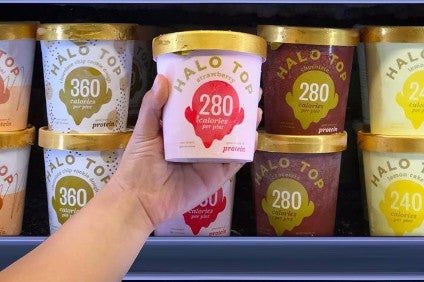
Unilever, the world’s largest ice-cream maker, has admitted the entry of fledgling US brand Halo Top has hit its business in the country.
The Anglo-Dutch giant, home to ice cream brands including Ben & Jerry’s and Magnum, yesterday (19 October) reported falling underlying volumes from its refreshment division, from where it runs its ice cream and beverage interests.

Discover B2B Marketing That Performs
Combine business intelligence and editorial excellence to reach engaged professionals across 36 leading media platforms.
For the three months to the end of September, Unilever’s refreshment arm posted a 2.4% decline in underlying volumes. Sales were up 3.1% but were boosted by pricing.
The hurricanes that hit parts of the US, Central America and the Caribbean, plus poor weather in Europe, also weighed on Unilever’s ice-cream unit. However, Unilever’s management called out the impact Halo Top had had on its US business, an unusually open admission from a major CPG company.
“The battle with Halo Top in North America, that proposition has built a 5% share position very, very quickly,” CFO Graeme Pitkethly said. “It’s taken 1.5 share points from us.”
Pitkethly said Unilever had moved to launch its own range of protein-enhanced ice cream, Breyers Delights. The Unilever finance chief said the speed at which Unilever had got that line to market was a consequence of the company’s moves to make its entire business but more agile.

US Tariffs are shifting - will you react or anticipate?
Don’t let policy changes catch you off guard. Stay proactive with real-time data and expert analysis.
By GlobalData“We have responded very quickly with Breyers. It’s taken us six months to get the Breyers licence in the marketplace, that’s very quick compared to where we were, that’s the benefit of the new organisation,” Pitkethly said. However, he added: “But it’s not quick enough because that proposition is being built.”
Asked when Unilever expects to win back the loss in market share, Pitkethly said: “We do think we will recover quickly to a winning position and growth again in North America in particular.”
Halo Top is owned by US business Eden Creamery, set up in 2012 by a former lawyer, Justin Woolverton and now the company’s CEO. In August, Reuters reported Eden Creamery had hired banking advisers to prepare a process to sell the business.
That report came days after Eden Creamery had said Halo Top had become the “best-selling pint [of ice cream] in US conventional grocery”, citing its assessment of data from IRI for the four weeks to 16 July.
Unilever’s ice-cream business in Europe suffered from less-favourable weather in the region compared to recent years. The company was also content to give up some market share in Europe on what Andrew Stephen, the group’s vice-president for investor relations, called “low-margin, bulk, in-home ice cream”.
However, Pitkethly said Unilever was “feeling good” about the performance of its wider ice-cream business this year.
“The competitive share losses to Halo Top, but also the very poor European weather in September, that poor Q3, masked what actually been a pretty good performance I think in many markets,” he told investors and analysts on a conference call to discuss Unilever’s third-quarter sales.
“Our fastest-growing brand, in the whole portfolio, at the moment, is Magnum which is close to 15% growth. We’ve had some great innovation performance. I talked about Magnum Pints going into 20 markets, really, really quickly. Magnum Double, Ben & Jerry’s, all of our big-bet innovations, the big assets that we brought to the marketplace in ice cream this year, have gone on very, very successfully. So we are feeling confident in ice cream.”



